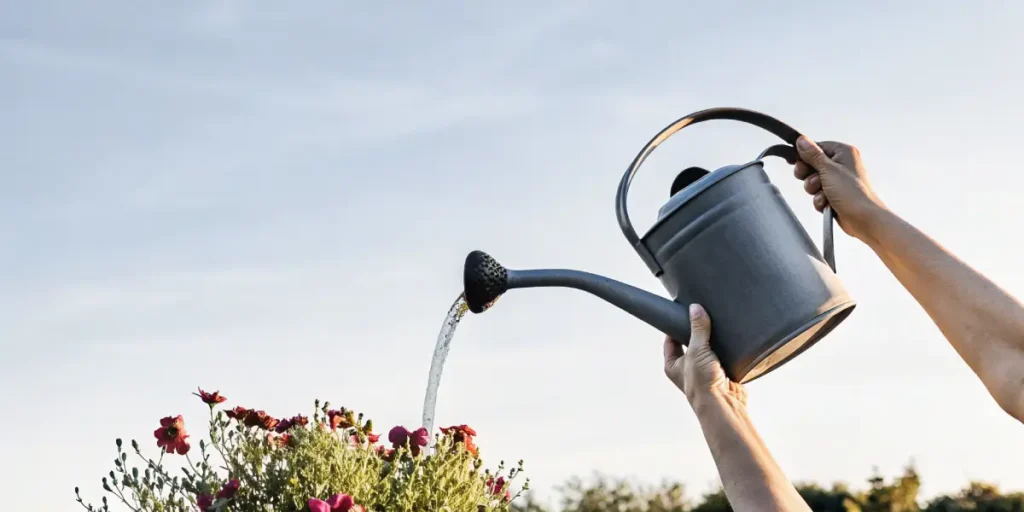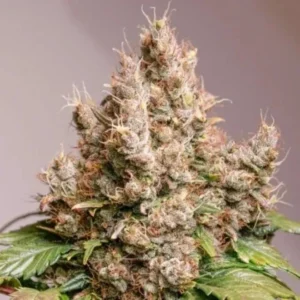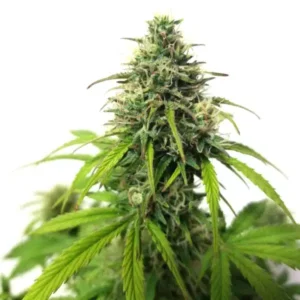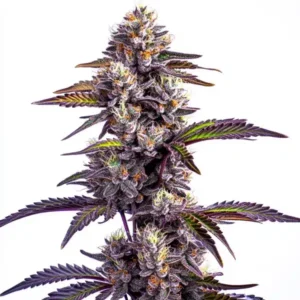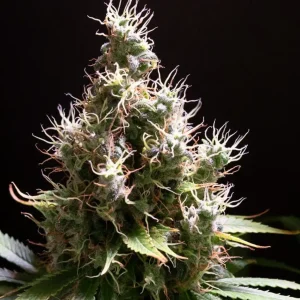Finding the best compost tea for flowering goes far beyond following a simple recipe. Compost tea is a powerful, living solution made by steeping organic compost in water, creating a nutrient-rich brew packed with beneficial microbes. When applied during the flowering stage, it helps cannabis plants improve nutrient uptake, boost bud development, and maximize overall yield, acting like a natural performance enhancer for healthy, productive flowers.
The flowering stage is crucial for cannabis growers. It’s where the magic happens. With the right compost tea, you can enhance the quality and yield of your flowers. This stage demands a different nutrient profile, and that’s where the best compost tea recipe for flowering plants comes into play. Let’s dive into the secrets of crafting compost tea that will make your garden bloom.
Recommended Strains
Auto Red Tropicana Cookies
|
|
THC | 20% - 24% (Medium) |
|
|
Lineage | Red Tropicana Cookies x Auto Night Queen |
|
|
Type | Autoflowering |
|
|
Height | 4.27 ft | 1.3 m |
|
|
Yield | High |
|
|
Yield Indoor | 1.8 - 1.97 oz/ft² | 550 - 600 g/m² |
|
|
Life Cycle | 10 - 11 weeks |
|
|
Phenotype | 50% Indica / 50% Sativa |
|
|
Effects | Creative, Happy, Uplifted |
|
|
Flavors | Sweet, Fruity, Berry, Apricot |
CBD Auto 20:1
|
|
CBD | 19% – 20% (Medium) |
|
|
Lineage | Unknown x Ruderalis |
|
|
Type | CBD Autoflowering |
|
|
Height | 3.94 ft | 1.2 m |
|
|
Yield | Medium |
|
|
Yield Indoor | 1.15 - 1.47 oz/ft² | 350 - 450 g/m² |
|
|
Life Cycle | 9 - 10 weeks |
|
|
Phenotype | 50% Indica / 50% Sativa |
|
|
Effects | Relaxed, Happy, Uplifted |
|
|
Flavors | Sweet, Honey, Fruity |
One of the all-time favorites for cannabis growers is the White Widow strain from Global Green Genetics. Known for its robust growth and resilience, White Widow responds exceptionally well to a nutrient-rich compost tea for flower growth. You’ll see the white, resinous buds forming beautifully when nourished with a good compost tea.
Benefits of Organic Compost Tea for Flowering Gardens
Organic compost tea for flowering gardens is a game-changer. It enhances soil biology by introducing beneficial microorganisms that break down organic matter. This process releases nutrients in a form that plants can easily absorb. When your plants have access to these nutrients, they grow healthier and more vibrant.
Think of organic compost tea as a natural booster. It’s not just about feeding your plants; it’s about improving the entire ecosystem of your garden. The best compost tea for flowering acts as a catalyst, promoting strong roots, lush foliage, and abundant blooms. Your cannabis plants will thank you with bigger, more potent buds.
Moreover, organic compost tea can significantly improve the water retention capacity of the soil, reducing the need for frequent watering. This is especially beneficial in areas prone to drought or for gardeners looking to conserve water. By enhancing the soil’s structure, it also promotes better aeration, ensuring that roots receive adequate oxygen, which is vital for optimal plant health.
Using homemade compost tea for flowering stage not only aligns with sustainable gardening practices but also reduces your garden’s dependency on chemical fertilizers. This approach not only benefits the plants but also protects beneficial insects and microorganisms that contribute to a balanced ecosystem. In the long run, your garden becomes a thriving habitat for various forms of life, supporting biodiversity while yielding beautiful blooms.
Crafting the Best Compost Tea Recipe for Flowering Plants
Making your own compost tea can be a fulfilling DIY project. Start with quality compost, preferably from your compost bin. Add it to a bucket of dechlorinated water. This simple homemade compost tea for flowering stage can transform your garden. Let it steep for 24 to 48 hours, stirring occasionally to oxygenate the brew.
Add ingredients like molasses, which feed the beneficial bacteria in the tea. You might also include kelp meal or fish emulsion for added nutrients. Strain the mixture before applying it to your plants. This DIY compost tea for flowering cannabis is a cost-effective, organic way to support your plants.
To create the best compost tea recipe for flowering plants, consider experimenting with different organic additives. Some gardeners swear by adding worm castings, which are rich in essential nutrients and beneficial microbes. Alfalfa meal, with its natural growth hormones, can also be a valuable addition, promoting robust flowering and increased yields.
Remember, the key to successful compost tea is balance. Too many ingredients can lead to an over-concentrated brew, which may harm your plants. Start with small quantities and monitor your plants’ response. Adjust the recipe based on the specific needs of your garden and the strains you are cultivating, ensuring that your compost tea remains a powerful aid in the flowering process.
Best Compost Tea for Flowering – Quick Overview
| Element | Recommended Option |
|---|---|
| Base Ingredient | High-quality compost or worm castings |
| Water Type | Dechlorinated water |
| Brewing Time | 24–48 hours |
| Oxygenation | Manual stirring or air pump |
| Microbe Food | Unsulfured molasses |
| Flowering Boosters | Kelp meal, fish emulsion, bat guano |
| Application Method | Soil drench or root zone |
| Application Frequency | Every 2–4 weeks |
| Best Time to Apply | Early morning or late afternoon |
| Ideal Use Stage | Early to mid flowering |
Tips for Using Nutrient-Rich Compost Tea for Flower Growth
When using nutrient-rich compost tea, timing is crucial. Apply it during the early morning or late afternoon to prevent leaf burn. This timing also allows the plants to absorb nutrients more effectively. Water the soil thoroughly before applying the tea to ensure even distribution.
Start with a diluted solution, especially if it’s your first time using compost tea. Observe your plants’ reaction before increasing the concentration. Look for signs of improved growth, such as vibrant leaves and robust buds. With regular use, you’ll notice a significant difference in your garden’s health.
Besides to timing, be mindful of the season and weather conditions when applying compost tea. During hot, dry spells, the risk of leaf burn increases, so it’s crucial to dilute the tea further or adjust the application schedule. Conversely, in cooler, wetter conditions, you might need to reduce the frequency to prevent waterlogging the soil.
It’s also essential to tailor your nutrient-rich compost tea for flower growth according to the specific strains you are cultivating. Some strains, like sativas, may require a lighter formula, while indicas might thrive on a richer blend. Knowing the unique needs of your plants will help you maximize the benefits of your compost tea applications.

Common Mistakes When Brewing Compost Tea
One common mistake is using chlorinated water, which can kill beneficial microbes. Always dechlorinate your water by letting it sit out overnight or using a water filter. Another error is not aerating the brew enough. Oxygen is essential for the beneficial bacteria to thrive.
Avoid over-brewing your compost tea. If left too long, it can become anaerobic, leading to a foul smell and harmful bacteria growth. Stick to the recommended brewing time for the best results. Remember, your goal is to create a living brew teeming with life.
Another frequent error is neglecting to clean your brewing equipment thoroughly. Residue from previous batches can contaminate your new brew, introducing unwanted pathogens. Clean your buckets, strainers, and aerators before each use to maintain the integrity of your compost tea.
Also, be cautious about the storage of your ingredients. Stale or poor-quality compost can compromise the effectiveness of your tea. Store your compost and additives in a cool, dry place to preserve their potency, ensuring that every batch of compost tea you brew is as effective as possible.
FAQs
What is the best compost tea recipe for flowering plants?
The best compost tea recipe for flowering plants includes high-quality compost, dechlorinated water, and additional nutrients like molasses or kelp meal. The key is to provide a balanced nutrient profile that supports the flowering stage. This recipe feeds beneficial microbes, which in turn feed your plants.
Experiment with different ingredients to find what works best for your plants. Some growers add alfalfa meal or bat guano for extra boost. The goal is to create a nutrient-rich compost tea for flower growth that enhances your plants’ potential. Remember, the quality of your inputs will determine the quality of your tea.
In creating the best compost tea recipe for flowering plants, don’t hesitate to experiment with local ingredients that might be readily available. Items like seaweed or nettles can provide additional minerals and nutrients, enhancing the overall effectiveness of your brew. Tailoring your recipe to your environment can yield surprising benefits.
Additionally, consider the pH level of your compost tea, as it can affect nutrient availability. Aim for a balanced pH to ensure that your plants can access the full spectrum of nutrients present in the tea. Regular testing and adjustments will help you maintain an ideal environment for flowering plants.
How often should I apply compost tea during the flowering stage?
Apply compost tea every two to four weeks during the flowering stage. This frequency ensures a steady supply of nutrients and beneficial microbes. However, it’s essential to monitor your plants’ response. If they show signs of nutrient burn, reduce the frequency or concentration.
Each garden is unique, so adjust your schedule based on your plants’ needs. Some strains may require more frequent applications, while others thrive with less. Pay attention to how your plants react and adjust accordingly for the best results.
In regions with varying climatic conditions, you may need to adjust the frequency of applications. For instance, in a particularly rainy season, reducing the frequency may prevent oversaturation of the soil, which can lead to root rot. Conversely, in dry conditions, maintaining a regular application schedule can help support plant hydration and nutrient uptake.
As you gain experience with your specific garden environment, you will develop a keen sense of how often to apply compost tea. Observing plant health and soil conditions will guide you in making the necessary adjustments to optimize the benefits of your compost tea regimen.
Can I use compost tea with synthetic fertilizers?
Compost tea is best used with organic growing practices. Synthetic fertilizers can disrupt the microbial life in your tea, reducing its effectiveness. If you prefer to use synthetic fertilizers, apply them separately from your compost tea.
For those committed to organic gardening, sticking with organic inputs ensures the best benefits from your compost tea. It complements the natural processes in your garden, leading to healthier plants and richer blooms.
Combining organic compost tea with organic soil amendments can create a synergistic effect, further enhancing plant health and productivity. Materials like bone meal or rock phosphate can complement the nutrients provided by compost tea, offering a comprehensive nutrient profile for your flowering plants.
If you decide to transition from synthetic to organic practices, give your garden time to adjust. The soil biology may initially struggle, but over time, the transition will lead to a more resilient and sustainable growing environment, where the best compost tea for flowering becomes an integral part of your gardening success.
What are the signs that my compost tea is working?
Healthy plants are the most obvious sign that your compost tea is working. Look for vibrant, lush foliage and strong, vigorous growth. Your flowers should be abundant and high-quality, with a rich aroma and flavor.
Additionally, you may notice improved soil health. The soil structure should become more friable, and earthworm activity might increase. These indicators show that your compost tea is enhancing the overall environment of your garden.
Other signs of a successful compost tea application include enhanced resistance to pests and diseases. Plants nourished with nutrient-rich compost tea for flower growth often display increased resilience, with fewer instances of leaf spots and fungal infections.
Furthermore, observe the long-term impact on your garden. Over multiple growing cycles, you should see a cumulative improvement in soil quality and plant performance, confirming that your homemade compost tea for flowering stage is contributing positively to your garden’s ecosystem.
Is homemade compost tea for flowering stage as effective as commercial products?
Homemade compost tea for flowering stage can be just as effective, if not more so, than commercial products. By making it yourself, you control the ingredients and can tailor the recipe to your specific plants’ needs. Plus, it’s often more cost-effective.
With practice, you can produce a high-quality compost tea that rivals commercial options. Focus on high-quality inputs and proper brewing techniques. Over time, you’ll develop a brew that perfectly supports your garden’s flowering stage.
Creating your own compost tea also allows for customization and innovation. You can adjust the formula based on seasonal changes, specific plant requirements, and new research findings, ensuring that your tea remains the best compost tea for flowering available to you.
Moreover, the satisfaction of producing a successful DIY compost tea for flowering cannabis is unparalleled. As you witness the thriving results in your garden, you’ll gain confidence in your gardening skills and deepen your understanding of natural plant care practices.

